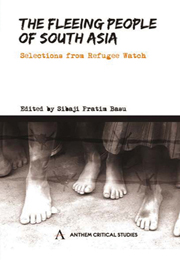Book contents
- Frontmatter
- Contents
- Acronyms and Abbreviations
- Foreword by Ranabir Samaddar
- Preface
- ETHICAL ISSUES
- LAWS
- Introduction
- Human Rights, Humanitarian Laws and the Continuing Displacement in Sri Lanka
- The Foreigner and the Right to Justice in the Aftermath of September 11th
- Exclusion from Refugee Protection in Europe: An Attempt at Legal Conceptualization
- Women's Rights, Asylum Jurisprudence and the Crises of International Human Rights Interventions
- Strengthening Protection of the IDPs
- French Suburbia 2005: The Return of the Political Unrecognized
- SOUTH ASIA
- INDIA
- GENDER
- INTERVIEW/CORRESPONDENCE
- REPRESENTATIONS
- Index
French Suburbia 2005: The Return of the Political Unrecognized
from LAWS
Published online by Cambridge University Press: 05 March 2012
- Frontmatter
- Contents
- Acronyms and Abbreviations
- Foreword by Ranabir Samaddar
- Preface
- ETHICAL ISSUES
- LAWS
- Introduction
- Human Rights, Humanitarian Laws and the Continuing Displacement in Sri Lanka
- The Foreigner and the Right to Justice in the Aftermath of September 11th
- Exclusion from Refugee Protection in Europe: An Attempt at Legal Conceptualization
- Women's Rights, Asylum Jurisprudence and the Crises of International Human Rights Interventions
- Strengthening Protection of the IDPs
- French Suburbia 2005: The Return of the Political Unrecognized
- SOUTH ASIA
- INDIA
- GENDER
- INTERVIEW/CORRESPONDENCE
- REPRESENTATIONS
- Index
Summary
As Alessandro Dal Lago wrote recently (‘Rogo d'Europa’, il manifesto 28-10-2005), ‘it is just the beginning’. It concerns Europe. It is only a warning. Angry desolate French males in the depressing suburbia and some city centres have vandalized public or private property, burnt thousands of cars, scorched schools and kindergartens, terrorized their neighbours, public opinion and the well meaning universalist France de souche. Triggered but not caused by the (not so) accidental death of two boys fleeing the police (as they are constantly confronted with identity checks), the violence is inevitably perceived by the mainstream protectionist discourse, unwilling to catch its political gist, as blind and irrational. Those rioters and their movement are the symptom of a very serious malaise. To one coming from the former Yugoslavia, the French events and situation is reminiscent of unpleasant recent memories, toute proportion gardée. There, like here, since the fatal series of wars (I am leaving aside their history and complex reasons) which, far from being caused by ethnicized identities, had produced them – it has become impossible to claim multiple belongings and crossed identities. […]
The ‘unexpected’ appearance of suddenly visible revolted bodies and of their direct, unmediated violent action beyond language cannot at all be received as carrying political claims within the existing public space. It is a wild demand to topple the existing hegemony and replace it with a new, a just one.
- Type
- Chapter
- Information
- The Fleeing People of South AsiaSelections from Refugee Watch, pp. 129 - 136Publisher: Anthem PressPrint publication year: 2009



